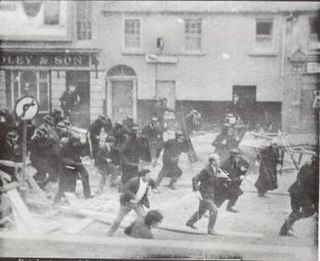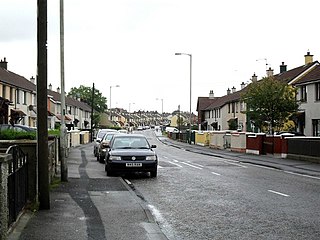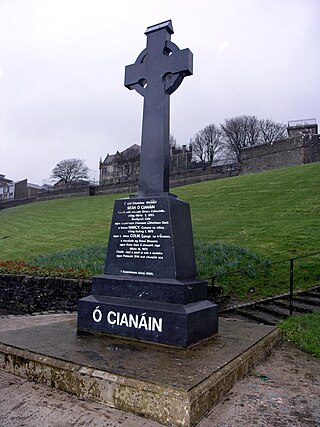
The Troubles were an ethno-nationalist conflict in Northern Ireland that lasted for about 30 years from the late 1960s to 1998. Also known internationally as the Northern Ireland conflict, it is sometimes described as an "irregular war" or "low-level war". The conflict began in the late 1960s and is usually deemed to have ended with the Good Friday Agreement of 1998. Although the Troubles mostly took place in Northern Ireland, at times violence spilled over into parts of the Republic of Ireland, England, and mainland Europe.
The Bogside is a neighbourhood outside the city walls of Derry, Northern Ireland. The large gable-wall murals by the Bogside Artists, Free Derry Corner and the Gasyard Féile are popular tourist attractions. The Bogside is a majority Catholic/Irish republican area, and shares a border with the Protestant/Ulster loyalist enclave of the Fountain.

Free Derry was a self-declared autonomous Irish nationalist area of Derry, Northern Ireland that existed between 1969 and 1972 during the Troubles. It emerged during the Northern Ireland civil rights movement, which sought to end discrimination against the Irish Catholic/nationalist minority by the Protestant/unionist government. The civil rights movement highlighted the sectarianism and police brutality of the overwhelmingly Protestant police force, the Royal Ulster Constabulary (RUC).

Free Derry Corner is a historical landmark in the Bogside neighbourhood of Derry, Northern Ireland, which lies in the intersection of the Lecky Road, Rossville Street and Fahan Street. A free-standing gable wall commemorates Free Derry, a self-declared autonomous nationalist area of Derry that existed between 1969 and 1972. On the corner is a memorial to the 1981 hunger strikers and several murals. There is also a memorial to those who died engaging in paramilitary activity as part of the Provisional IRA's Derry Brigade.

The Battle of the Bogside was a large three-day riot that took place from 12 to 14 August 1969 in Derry, Northern Ireland. Thousands of Catholic/Irish nationalist residents of the Bogside district, organised under the Derry Citizens' Defence Association, clashed with the Royal Ulster Constabulary (RUC) and loyalists. It sparked widespread violence elsewhere in Northern Ireland, led to the deployment of British troops, and is often seen as the beginning of the thirty-year conflict known as the Troubles.
This is a chronology of activities by the Provisional Irish Republican Army (IRA) from 1970 to 1979.
Murals in Northern Ireland have become symbols of Northern Ireland, depicting the region's past and present political and religious divisions.
The Derry Housing Action Committee (DHAC), was an organisation formed in 1968 in Derry, Northern Ireland to protest about housing conditions and provision.

During 12–16 August 1969, there was an outbreak of political and sectarian violence throughout Northern Ireland, which is often seen as the beginning of the thirty-year conflict known as the Troubles. There had been sporadic violence throughout the year arising out of the Northern Ireland civil rights campaign, which demanded an end to discrimination against Catholics and Irish nationalists. Civil rights marches had been attacked by Protestant loyalists, and protesters often clashed with the Royal Ulster Constabulary (RUC), the overwhelmingly Protestant police force.

Creggan is a large housing estate in Derry, Northern Ireland, on a hill not far from the River Foyle. It lies on the townlands of Ballymagowan and Edenballymore.
Events during the year 1969 in Northern Ireland.
Patrick Laurence Doherty, better known as Paddy 'Bogside' Doherty, was a Northern Irish activist from Derry, known for his activism in rebuilding the city after The Troubles.

Seán Keenan was an Irish republican from Derry, Northern Ireland. His father James Keenan was a Quartermaster in the Irish Republican Army (IRA).
The city of Derry, Northern Ireland, was severely affected by the Troubles. The conflict is widely considered to have begun in the city, with many regarding the Battle of the Bogside in 1969 as the beginning of the Troubles. The Bloody Sunday incident of 1972 occurred in Derry, in the Bogside area.

Brigid Makowski was an Irish Republican activist and politician from Derry, Northern Ireland. A member of Clan na Gael in the 1960s, she became especially politically active following the start of the Troubles in 1969. Following the split in Sinn Féin that same year, she sided with Official Sinn Féin and formally joined the party in 1970. However, following the declaration of a ceasefire by the Official Irish Republican Army in 1974, Makowski broke from the officials and helped found the Irish Republican Socialist Party. In 1981 she was elected to Shannon Town Commission in County Clare and later she became a member of Clare County Council in the 1990s.

From 6 to 11 July 1997 there were mass protests, fierce riots and gun battles in Irish nationalist districts of Northern Ireland. Irish nationalists/republicans, in some cases supported by the Provisional Irish Republican Army (IRA), attacked the Royal Ulster Constabulary (RUC) and British Army. The protests and violence were sparked by the decision to allow the Orange Order to march through a Catholic/nationalist neighbourhood of Portadown. Irish nationalists were outraged by the decision and by the RUC's aggressive treatment of those protesting against the march. There had been a bitter dispute over the march for many years.
The Northern Ireland civil rights movement dates to the early 1960s, when a number of initiatives emerged in Northern Ireland which challenged the inequality and discrimination against ethnic Irish Catholics that was perpetrated by the Ulster Protestant establishment. The Campaign for Social Justice (CSJ) was founded by Conn McCluskey and his wife, Patricia. Conn was a doctor, and Patricia was a social worker who had worked in Glasgow for a period, and who had a background in housing activism. Both were involved in the Homeless Citizens League, an organisation founded after Catholic women occupied disused social housing. The HCL evolved into the CSJ, focusing on lobbying, research and publicising discrimination. The campaign for Derry University was another mid-1960s campaign.
Sir Robert Edward Graham Shillington CBE was a senior Northern Irish police officer. He served as Chief Constable of Royal Ulster Constabulary from 1970 to 1973.
The Derry Brigade of the Provisional Irish Republican Army (IRA) operated in the city of Derry, Northern Ireland, and its surroundings during the Troubles. The Derry Brigade was one of the most active groups in the IRA.
On 11 August 1970, two Royal Ulster Constabulary (RUC) officers were killed by a booby-trap bomb planted under a car by the Provisional Irish Republican Army (IRA) near Crossmaglen, in County Armagh, Northern Ireland. They were the first RUC officers to be killed by republicans during the Troubles and the first security forces to be killed in South Armagh, an IRA stronghold for much of the conflict.







